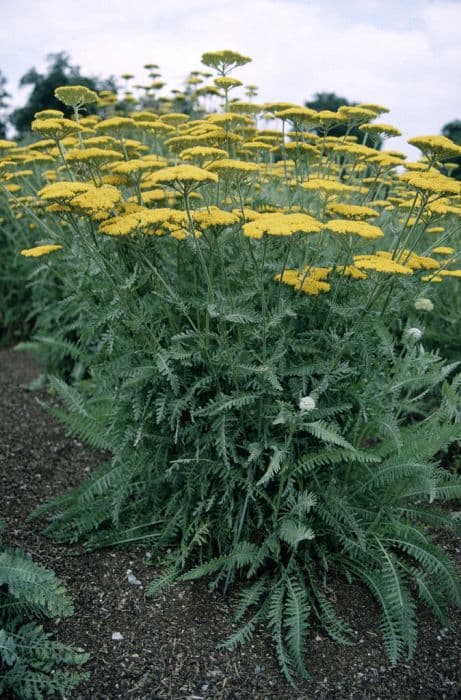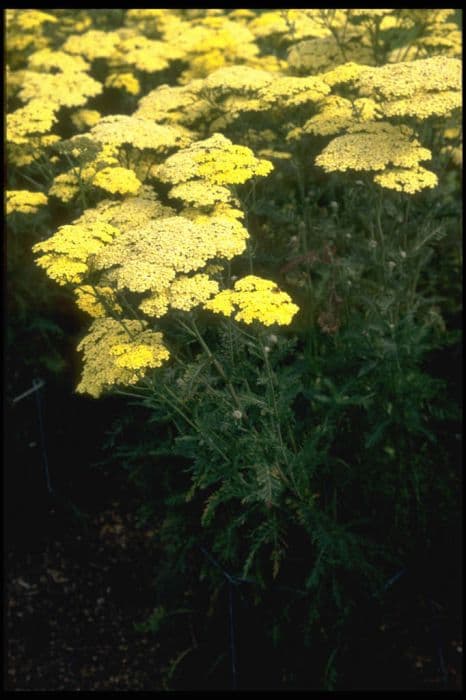Yarrow Achillea 'Summerwine'

ABOUT
Achillea 'Summerwine' is a captivating perennial known for its striking visual appeal. This plant features lush, fern-like foliage that provides a beautiful green backdrop for its standout blooms. The leaves are finely dissected, creating a delicate and soft texture. Above this dense foliage rise clusters of deep red to wine-colored flowers, which are composed of small, tightly packed florets. These flower heads are flat-topped and offer a landing platform for various pollinators, such as bees and butterflies. The blooms appear over a long period, typically beginning in early summer and continuing through late summer, sometimes extending their show into the fall. As the flowers age, they can fade to a lighter color, adding to the plant's visual interest through a gradient of tones over time. The rich, warm hue of 'Summerwine' flowers add a touch of elegance to any garden and are often used in cut flower arrangements because of their longevity and color stability. This hardy plant is easy to care for and can withstand a range of conditions, making it a popular choice for gardeners looking to create a low-maintenance yet vibrant garden display. It pairs well with other sunny-border perennials and grasses, creating stunning contrasts or harmonious color schemes within a garden setting. Overall, Achillea 'Summerwine' is a resilient and beautiful addition to any garden, wooing with its ferny foliage and captivating wine-red flowers.
About this plant
 Names
NamesFamily
Asteraceae.
Synonyms
Summerwine Yarrow, Summerwine Common Yarrow, Summerwine Sneezewort, Summerwine Milfoil.
Common names
Achillea 'Summerwine'.
 Toxicity
ToxicityTo humans
Yarrow 'Summerwine' is generally not considered toxic to humans. However, like many plants, it can potentially cause mild irritation if there is skin contact with its sap, especially in individuals with sensitive skin or allergies. Ingesting the plant is unlikely to be dangerous, but it's not recommended as it might cause stomach discomfort or other gastrointestinal symptoms in some people.
To pets
Yarrow 'Summerwine' is also generally considered non-toxic to pets, including dogs and cats. While not poisonous, eating large quantities of the plant may cause mild digestive upset in some animals, such as vomiting or diarrhea, due to the plant's natural compounds. It's advisable to keep an eye on pets around the garden to prevent any potential issues from overconsumption.
 Characteristics
CharacteristicsLife cycle
Perennials
Foliage type
Deciduous
Color of leaves
Green
Flower color
Red
Height
2-3 feet (0.6-0.9 meters)
Spread
2-3 feet (0.6-0.9 meters)
Plant type
Herb
Hardiness zones
3-8
Native area
Europe
Benefits
 General Benefits
General Benefits- Attracts pollinators: Summerwine Yarrow brings bees, butterflies, and other beneficial insects to the garden.
- Drought tolerance: Once established, it's very drought-resistant, requiring minimal water.
- Low maintenance: It's an easy-to-care-for plant that doesn't need a lot of attention or pampering.
- Heat resistance: Summerwine Yarrow can withstand high temperatures and thrives in hot climates.
- Long blooming period: It offers a long season of color, with flowers from early summer to fall.
- Deer and rabbit resistance: Its aromatic foliage is less palatable to deer and rabbits, reducing damage from these animals.
- Soil adaptability: This plant is tolerant of a wide range of soil conditions, including poor soils.
- Landscape versatility: It can be used for borders, rock gardens, and as a ground cover.
- Improves biodiversity: By attracting various insects, it contributes to a diverse and healthy ecosystem in the garden.
- Cut flowers: Its blooms make excellent fresh cut flowers for arrangements.
- Dried flowers: The flowers also dry well for use in long-lasting dried floral displays.
 Medical Properties
Medical Properties- Anti-inflammatory: Achillea 'Summerwine', like other yarrow varieties, has traditionally been used to reduce inflammation.
- Antiseptic: The plant is believed to have antiseptic properties that may help prevent infection in wounds.
- Astringent: The astringent effects are utilized to tighten tissues and staunch bleeding.
- Carminative: Yarrow has been used to relieve digestive issues by reducing gas and bloating.
- Diaphoretic: It may induce sweating to help lower fever and aid in detoxification processes.
- Hemostatic: The plant can potentially be used to promote blood clotting and control bleeding.
- Expectorant: Yarrow has been traditionally used to aid in expelling mucus from the respiratory tract.
- Analgesic: There are historical references to yarrow being used to alleviate pain.
 Air-purifying Qualities
Air-purifying QualitiesThis plant is not specifically known for air purifying qualities.
 Other Uses
Other Uses- The Yarrow 'Summerwine' can be used in natural dye-making processes, providing a range of colors from green to yellow, depending on the mordant used.
- Insectary plantings often include Yarrow to attract beneficial insects like ladybugs and predatory wasps that help control garden pests.
- Its sturdy stems and long-lasting flowers make Yarrow a popular choice for creating dried floral arrangements or wreaths.
- Composting enthusiasts sometimes add Yarrow to their compost piles, as it is believed to accelerate the composting process by contributing beneficial nutrients.
- As a companion plant, Yarrow can enhance the growth and flavor of certain vegetables and herbs when planted in close proximity to them in the garden.
- Some textile artisans use the stalks of Yarrow in the preparation of handmade paper for added texture and visual interest.
- Landscape designers value Yarrow 'Summerwine' for xeriscaping, as it is drought-resistant and can thrive in low-water environments.
- Yarrow leaves can be used in mulches to help retain soil moisture and as a green layer in lasagna gardening due to their quick decomposition.
- Fragrant Yarrow varieties, including 'Summerwine', can be used in creating natural insect repellents for outdoor living spaces.
Interesting Facts
 Feng Shui
Feng ShuiThe Yarrow is not used in Feng Shui practice.
 Zodiac Sign Compitability
Zodiac Sign CompitabilityThe Yarrow is not used in astrology practice.
 Plant Symbolism
Plant Symbolism- Healing: Named after Achilles, the legendary Greek hero, Achillea is believed to symbolize healing due to its historical use in treating wounds on the battlefield.
- Protection: Often associated with warding off negative energies, Achillea is considered to carry protective qualities.
- Courage: Reflecting the courage of Achilles himself, this plant is thought to represent bravery and valor.
- Love: Achillea can symbolize lasting love and is sometimes used in wedding bouquets for this reason.
 Water
WaterCommon yarrow, which includes the 'Summerwine' variety, prefers well-drained soil and does not tolerate waterlogging. Water it thoroughly to encourage deep root growth, but allow the soil to dry out between watering sessions. On average, watering once a week with approximately 1 inch of water should suffice. In hot or dry conditions, increase the frequency to maintain soil moisture, but be careful not to overwater as common yarrow is drought tolerant. During the winter or in colder climates, reduce watering as the plant requires less moisture due to slower growth.
 Light
LightCommon yarrow, including the 'Summerwine' variety, thrives best in full sun conditions. It needs at least 6 to 8 hours of direct sunlight daily to develop its full potential in terms of growth and flowering. Place your 'Summerwine' yarrow in an unobstructed area where it can receive ample sunlight throughout the day for optimal performance.
 Temperature
TemperatureCommon yarrow, such as the 'Summerwine' variety, is a hardy plant that can withstand a wide range of temperatures. It grows best in temperatures between 65°F and 75°F but can survive colder conditions down to -30°F and even withstand hot summer temperatures above 80°F. To ensure the best growth and flowering, aim to maintain the i'deal temperature whenever possible.
 Pruning
PruningCommon yarrow, including 'Summerwine', should be pruned to promote vigorous growth and to maintain an attractive appearance. Deadhead spent flowers regularly to encourage further blooming. After the first killing frost, cut the plant back to about 2 inches above the ground. Pruning is typically done in late fall or early spring.
 Cleaning
CleaningAs needed
 Soil
SoilYarrow 'Summerwine' thrives in well-draining soil with a pH range of 5.5 to 7.0. A mix containing garden soil, compost, and small gravel or perlite can help improve drainage. Fertilization should be minimal, as the plant prefers less fertile conditions.
 Repotting
RepottingYarrow 'Summerwine' typically does not require frequent repotting. It is generally repotted or divided every few years if it becomes too crowded or to rejuvenate its growth. Container-grown plants may need repotting when they outgrow their pots or the soil becomes compacted.
 Humidity & Misting
Humidity & MistingYarrow 'Summerwine' is tolerant of a wide range of humidity conditions and does not require high humidity to thrive. It can do well in both dry and average humidity environments found in most gardens without the need for special humidity adjustments.
 Suitable locations
Suitable locationsIndoor
Place Yarrow 'Summerwine' near a sunny window and water sparingly.
Outdoor
Grow in full sun to part shade, in well-drained soil.
Hardiness zone
3-9 USDA
 Life cycle
Life cycleSummerwine Yarrow (Achillea 'Summerwine') begins its life cycle as a seed, which, when sown in well-drained soil and with adequate sunlight, germinates to form a small seedling. The seedling grows into a vegetative state, establishing a rosette of fern-like foliage at the ground level before sending up taller stems. As the plant matures, it enters the flowering stage, producing clusters of deep red to burgundy flowers which attract bees, butterflies, and other pollinators during the summer months. After pollination, the flowers develop into seed heads, and the plant begins to set seeds for the next generation. Throughout the growing season, Summerwine Yarrow may undergo repeated cycles of blooming and seed setting if conditions are optimal and with proper care. Once the growing season ends, the plant enters a period of dormancy during the colder months, with the foliage dying back, to re-emerge and start the cycle anew in the spring.
 Propogation
PropogationPropogation time
Spring-Early Summer
Propogation: Achillea 'Summerwine', commonly known as Yarrow, is a perennial that can be propagated by division. The most popular method for propagating Yarrow is by dividing its clumps. This can be done in early spring or after the flowering period in the fall. To propagate by division, carefully dig up the established plant, ensuring a substantial root mass is kept intact. Using a sharp knife or spade, divide the clump into smaller sections, each with adequate roots and shoots. Replant the divisions immediately at the same soil depth they were previously growing. Water the new divisions thoroughly to help establish them. This method allows for rapid increase and maintains the characteristics of the parent plant.









